Intel Corporation (INTC.O) has suffered a significant setback in its efforts to build its fledgling contract manufacturing business, losing out on a lucrative contract to design and fabricate Sony’s (6758.T) next-generation PlayStation 6 chip.
According to sources familiar with the matter, Advanced Micro Devices (AMD.O) emerged victorious in a competitive bidding process, securing the contract to design and fabricate the chip for Sony’s highly anticipated gaming console.
The contract, worth billions of dollars, was seen as a crucial opportunity for Intel to establish itself as a major player in the contract manufacturing space. However, a dispute over profit margins and concerns over backwards compatibility ultimately led to Intel missing out on the deal.
Intel’s foundry business, launched in 2021, has struggled to attract big-name clients. The loss of the PlayStation 6 chip contract is a significant blow to the company’s efforts to establish itself as a major player in the contract manufacturing space.
“Winning the Sony PlayStation 6 chip design business would have been a victory for Intel’s design segment and would have doubled as a win for the company’s contract manufacturing effort,” said a source familiar with the matter.
AMD’s victory in securing the contract is a significant boost to the company’s already impressive portfolio of gaming console chip designs. The company has previously designed chips for Sony’s PlayStation 5 and Microsoft’s Xbox Series X consoles.
The loss of the contract raises concerns about Intel’s ability to compete in the contract manufacturing space. The company has struggled to attract big-name clients, and the loss of the PlayStation 6 chip contract is a significant setback.
Intel’s CEO, Pat Gelsinger, has announced plans to cut 15% of the company’s workforce and reduce capital spending on factory expansion. The company has also considered selling off certain businesses, including its programmable chip unit Altera.
Sony’s PlayStation console business is one of the most successful in the gaming industry, with over 100 million units sold across a half decade. The company’s next-generation console is highly anticipated, and the partnership with AMD is expected to deliver significant performance improvements.
One of the key concerns for Sony was ensuring backwards compatibility with earlier versions of the PlayStation console. Moving from AMD, which designed the PlayStation 5 chip, to Intel would have risked disrupting this compatibility.
In response to the news, an Intel spokesperson said, “We strongly disagree with this characterization but are not going to comment about any current or potential customer conversations. We have a very healthy customer pipeline across both our product and foundry business, and we are squarely focused on innovating to meet their needs.”
Intel’s loss of the PlayStation 6 chip contract to AMD is a significant blow to the company’s foundry business. The contract would have provided a major boost to Intel’s efforts to establish itself as a major player in the contract manufacturing space. Instead, AMD has secured a major win, cementing its position as a leading designer of gaming console chips.



